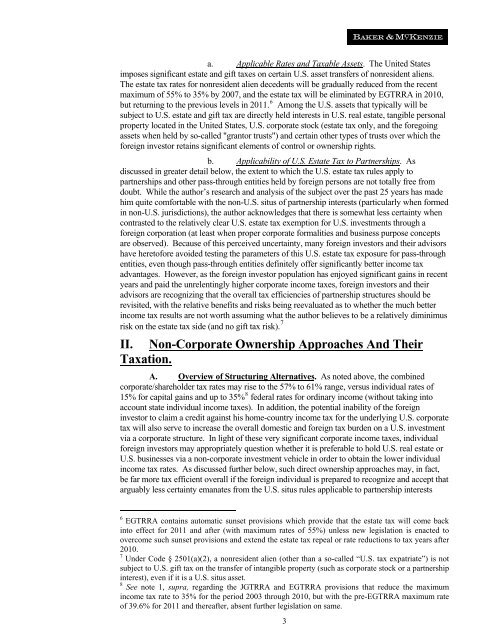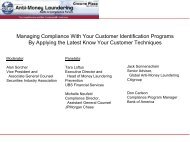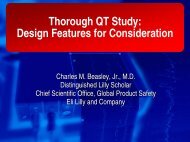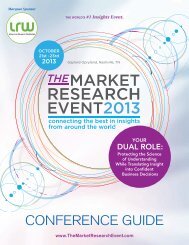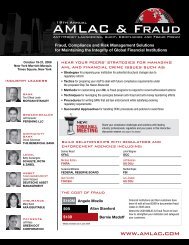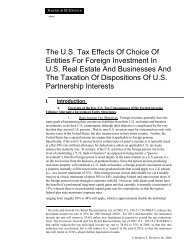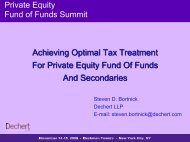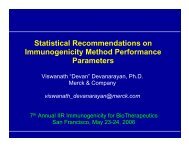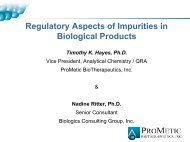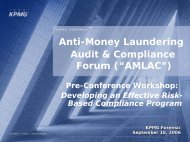The US Tax Effects Of Choice Of Entities For Foreign Investment - IIR
The US Tax Effects Of Choice Of Entities For Foreign Investment - IIR
The US Tax Effects Of Choice Of Entities For Foreign Investment - IIR
Create successful ePaper yourself
Turn your PDF publications into a flip-book with our unique Google optimized e-Paper software.
a. Applicable Rates and <strong>Tax</strong>able Assets. <strong>The</strong> United States<br />
imposes significant estate and gift taxes on certain U.S. asset transfers of nonresident aliens.<br />
<strong>The</strong> estate tax rates for nonresident alien decedents will be gradually reduced from the recent<br />
maximum of 55% to 35% by 2007, and the estate tax will be eliminated by EGTRRA in 2010,<br />
but returning to the previous levels in 2011. 6 Among the U.S. assets that typically will be<br />
subject to U.S. estate and gift tax are directly held interests in U.S. real estate, tangible personal<br />
property located in the United States, U.S. corporate stock (estate tax only, and the foregoing<br />
assets when held by so-called "grantor trusts") and certain other types of trusts over which the<br />
foreign investor retains significant elements of control or ownership rights.<br />
b. Applicability of U.S. Estate <strong>Tax</strong> to Partnerships. As<br />
discussed in greater detail below, the extent to which the U.S. estate tax rules apply to<br />
partnerships and other pass-through entities held by foreign persons are not totally free from<br />
doubt. While the author’s research and analysis of the subject over the past 25 years has made<br />
him quite comfortable with the non-U.S. situs of partnership interests (particularly when formed<br />
in non-U.S. jurisdictions), the author acknowledges that there is somewhat less certainty when<br />
contrasted to the relatively clear U.S. estate tax exemption for U.S. investments through a<br />
foreign corporation (at least when proper corporate formalities and business purpose concepts<br />
are observed). Because of this perceived uncertainty, many foreign investors and their advisors<br />
have heretofore avoided testing the parameters of this U.S. estate tax exposure for pass-through<br />
entities, even though pass-through entities definitely offer significantly better income tax<br />
advantages. However, as the foreign investor population has enjoyed significant gains in recent<br />
years and paid the unrelentingly higher corporate income taxes, foreign investors and their<br />
advisors are recognizing that the overall tax efficiencies of partnership structures should be<br />
revisited, with the relative benefits and risks being reevaluated as to whether the much better<br />
income tax results are not worth assuming what the author believes to be a relatively diminimus<br />
risk on the estate tax side (and no gift tax risk). 7<br />
II. Non-Corporate Ownership Approaches And <strong>The</strong>ir<br />
<strong>Tax</strong>ation.<br />
A. Overview of Structuring Alternatives. As noted above, the combined<br />
corporate/shareholder tax rates may rise to the 57% to 61% range, versus individual rates of<br />
15% for capital gains and up to 35% 8 federal rates for ordinary income (without taking into<br />
account state individual income taxes). In addition, the potential inability of the foreign<br />
investor to claim a credit against his home-country income tax for the underlying U.S. corporate<br />
tax will also serve to increase the overall domestic and foreign tax burden on a U.S. investment<br />
via a corporate structure. In light of these very significant corporate income taxes, individual<br />
foreign investors may appropriately question whether it is preferable to hold U.S. real estate or<br />
U.S. businesses via a non-corporate investment vehicle in order to obtain the lower individual<br />
income tax rates. As discussed further below, such direct ownership approaches may, in fact,<br />
be far more tax efficient overall if the foreign individual is prepared to recognize and accept that<br />
arguably less certainty emanates from the U.S. situs rules applicable to partnership interests<br />
6 EGTRRA contains automatic sunset provisions which provide that the estate tax will come back<br />
into effect for 2011 and after (with maximum rates of 55%) unless new legislation is enacted to<br />
overcome such sunset provisions and extend the estate tax repeal or rate reductions to tax years after<br />
2010.<br />
7 Under Code § 2501(a)(2), a nonresident alien (other than a so-called “U.S. tax expatriate”) is not<br />
subject to U.S. gift tax on the transfer of intangible property (such as corporate stock or a partnership<br />
interest), even if it is a U.S. situs asset.<br />
8 See note 1, supra, regarding the JGTRRA and EGTRRA provisions that reduce the maximum<br />
income tax rate to 35% for the period 2003 through 2010, but with the pre-EGTRRA maximum rate<br />
of 39.6% for 2011 and thereafter, absent further legislation on same.<br />
3


